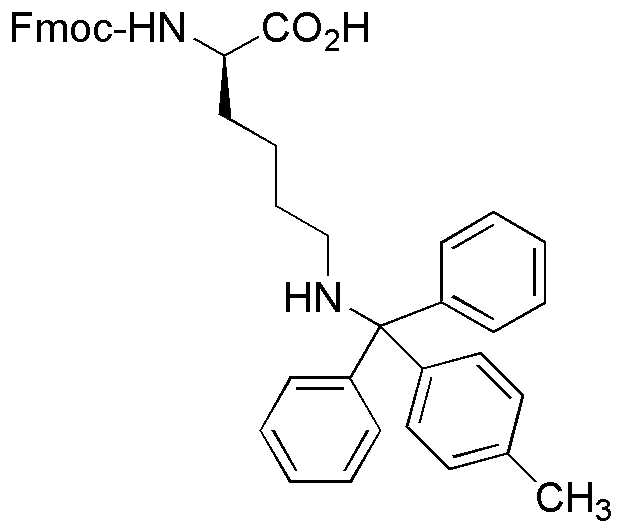Fmoc-Ne-methyltrityl-D-lysine is widely utilized in research focused on:
- Peptide Synthesis: This compound serves as a key building block in solid-phase peptide synthesis, enabling the creation of complex peptides with high purity and yield.
- Drug Development: It plays a crucial role in the pharmaceutical industry for developing peptide-based drugs, particularly in targeting specific receptors for enhanced therapeutic effects.
- Bioconjugation: Researchers use it to facilitate the conjugation of peptides to various biomolecules, improving the delivery and efficacy of therapeutic agents.
- Research in Neuroscience: This compound is valuable in studying neuropeptides, aiding in the understanding of neurological pathways and potential treatments for disorders.
- Custom Synthesis Services: Companies offering custom synthesis can utilize this compound to create tailored peptides for specific research needs, providing flexibility and innovation in experimental designs.
Informations générales
Propriétés
Sécurité et réglementation
Applications
Fmoc-Ne-methyltrityl-D-lysine is widely utilized in research focused on:
- Peptide Synthesis: This compound serves as a key building block in solid-phase peptide synthesis, enabling the creation of complex peptides with high purity and yield.
- Drug Development: It plays a crucial role in the pharmaceutical industry for developing peptide-based drugs, particularly in targeting specific receptors for enhanced therapeutic effects.
- Bioconjugation: Researchers use it to facilitate the conjugation of peptides to various biomolecules, improving the delivery and efficacy of therapeutic agents.
- Research in Neuroscience: This compound is valuable in studying neuropeptides, aiding in the understanding of neurological pathways and potential treatments for disorders.
- Custom Synthesis Services: Companies offering custom synthesis can utilize this compound to create tailored peptides for specific research needs, providing flexibility and innovation in experimental designs.
Documents
Fiches de données de sécurité (FDS)
La FDS fournit des informations de sécurité complètes sur la manipulation, le stockage et l’élimination du produit.
Spécifications du produit (PS)
Le PS fournit une description complète des propriétés du produit, notamment sa composition chimique, son état physique, sa pureté et les exigences de stockage. Il détaille également les plages de qualité acceptables et les applications prévues du produit.
Certificats d'analyse (COA)
Recherchez des certificats d'analyse (COA) en saisissant le numéro de lot du produit. Les numéros de lot et de lot se trouvent sur l'étiquette d'un produit, après les mots « Lot » ou « Lot de fabrication ».
Numéro de catalogue
Numéro de lot/série
Certificats d'origine (COO)
Ce certificat d'exploitation confirme le pays dans lequel le produit a été fabriqué, et détaille également les matériaux et composants utilisés et s'il est issu de sources naturelles, synthétiques ou autres sources spécifiques. Ce certificat peut être requis pour les douanes, le commerce et la conformité réglementaire.
Numéro de catalogue
Numéro de lot/série
Fiches de données de sécurité (FDS)
La FDS fournit des informations de sécurité complètes sur la manipulation, le stockage et l’élimination du produit.
DownloadSpécifications du produit (PS)
Le PS fournit une description complète des propriétés du produit, notamment sa composition chimique, son état physique, sa pureté et les exigences de stockage. Il détaille également les plages de qualité acceptables et les applications prévues du produit.
DownloadCertificats d'analyse (COA)
Recherchez des certificats d'analyse (COA) en saisissant le numéro de lot du produit. Les numéros de lot et de lot se trouvent sur l'étiquette d'un produit, après les mots « Lot » ou « Lot de fabrication ».
Numéro de catalogue
Numéro de lot/série
Certificats d'origine (COO)
Ce certificat d'exploitation confirme le pays dans lequel le produit a été fabriqué, et détaille également les matériaux et composants utilisés et s'il est issu de sources naturelles, synthétiques ou autres sources spécifiques. Ce certificat peut être requis pour les douanes, le commerce et la conformité réglementaire.


